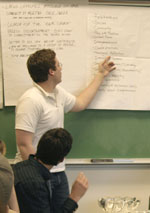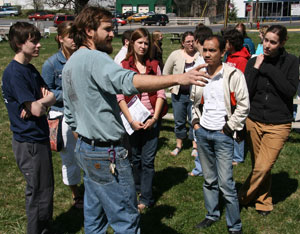Harrisonburg, Va. – “I love the church, and I hate the church.” This sentiment was expressed in a variety of ways by Mennonite college students at a gathering held at Eastern Mennonite University the end of March.
Students who have already participated in the Ministry Inquiry Program (MIP) or will do so this summer, as well as denominational and conference leaders, attended the meeting. MIP is a collaboration between Mennonite Church USA and Mennonite-affiliated colleges that allows students to spend 11 weeks serving in a congregation and exploring their call to pastoral ministry.
During the conference, the 40 participants, many who are from or will be serving in Franconia Conference congregations this summer, were invited to listen to and share visions of the church.
Many simply asked: What does it mean to be in the world but not of it? How do we live faithfully as members of the kingdom of God while also living in a society that often doesn’t share the same values?
“Is church what happens Sunday morning,” asked one participant, “Or is church what we do together?”
Steve Kriss, director of communication and leadership cultivation for Franconia Mennonite Conference, highlighted some challenges the Mennonite Church is facing as it becomes more diverse, including language and cultural barriers.
“I am convinced,” said Kriss, “that it is going to be a struggle for those of us who are Euro-American to figure out how to live in a future that doesn’t look like us anymore. We are going to deal with privilege and responsibility and with issues of cultural understanding.”
During a session led by Mike and Risha Metzler, who attend The Table, an emerging Mennonite congregation in Harrisonburg, participants were asked to share words or phrases describing their ideal vision of the church. “Authentic,” said one. “Welcoming,” added another. In a few moments the list had been extended to include adaptable, Christ-centered, radical, life-giving and honest.
Risha Metzler said she thinks The Table is just “one way of doing church.
“We’re not saying, ‘This is the way church should be,’ but it’s exciting and energizing to me to begin to address the issue that church isn’t working for a lot of people. So what do we do with that as believers? How do we make this work for more people?”
During sharing times, many expressed a desire for a safe space to ask questions and express their doubts and frustrations. Others expressed the need for the church to collectively deal with conflict.
 “We all have disagreements on all kinds of issues, but we pretend that doesn’t happen on Sunday morning or say we can’t talk about these in church,” said one person.
“We all have disagreements on all kinds of issues, but we pretend that doesn’t happen on Sunday morning or say we can’t talk about these in church,” said one person.
Throughout the conference, students struggled with how to foster community, intimacy and accountability in their churches and engage the broader culture at the same time.
“The church is pulled in two directions,” said Goshen College student Paul Boers. “One is the desire to grow deeply and intimately in relationship with each other. And the other is to welcome anyone and everyone. For good relationships to be fostered, they take time. And they take intentionality.”
“If we want the church to change,” said Boers, “we have to change ourselves.”
“One of the biggest things we can do is let our congregations know that we care,” said one student. “We need to tell them that we want to be the church now and that we want to be the future. And that we want to work with them to create something meaningful.”
Aldo Siahaan, a leader of Philadelphia (PA) Praise Center, summarized a general feeling of the conference: “Miracles come from movement. We need to keep moving towards God’s grace and toward his vision.”
Students and church leaders alike agreed that movement toward God’s vision for the church will result in the miracle of transformation in congregations.
Lora Steiner is a Harrisonburg resident.
View photos from this event
The opinions expressed in articles posted on Mosaic’s website are those of the author and may not reflect the official policy of Mosaic Conference. Mosaic is a large conference, crossing ethnicities, geographies, generations, theologies, and politics. Each person can only speak for themselves; no one can represent “the conference.” May God give us the grace to hear what the Spirit is speaking to us through people with whom we disagree and the humility and courage to love one another even when those disagreements can’t be bridged.


Thanks, Lora, for reporting on this. This is complex stuff…energizing, stretching, tiring…. But vision is becoming clearer for all of us, I think 🙂 and your work helps in that. –Forrest